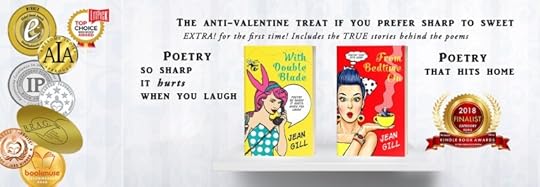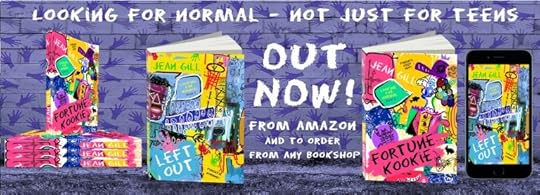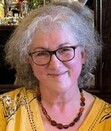In Conversation with Jean Gill, Author in Multiple Genres
In my last post of each month I’m in conversation with an author friend, each time on a different topic that I think will interest my readers. This month my guest is the prolific and versatile Jean Gill, who writes across an extraordinary range of genres, with considerable skill in each one. Whatever kind of books you prefer to read, Jean’s catalogue is bound to contain something that will appeal to you.
Debbie: Many authors specialise in a single genre, confident of the themes and tropes required to please readers. As Jean knows, I’m primarily a cosy mystery author, working in a field where reader expectation is clearly defined. It would be much harder to write across multiple genres. Jean, did you set out to write across multiple genres, or did that impulse evolve over time?
Jean: Over time, definitely. Four decades in fact – what a frightening thought!
Debbie: What genre was your debut book in?
Jean: Poetry. I had two poetry books published by the National Poetry Foundation in 1988 and 1996 before I turned to prose when I was forty and wrote my first novel.
 Jean has won many awards across various genres
Jean has won many awards across various genresDebbie: Which genres have you written in so far, and what appealed to you about them?
Jean: I’ve always had too many ideas, and each one cries out to be expressed in a particular form, so I’ve written in a crazy number of genres. Most readers will know me for my medieval fiction but I’ve also written poetry, plays, a cookery book, a memoir, a dog book, fantasy, second-chance love, WW2 military history, teen fact/fiction and even plays for stage and for television.
 More evidence of Jean’s versatility
More evidence of Jean’s versatilityDebbie: Are there any more genres you haven’t yet embraced that you planned to tackle, and if so, why?
Jean: I hope not! But genres find me. Some stories just insist on being written a certain way. If I was traditionally published or relied on my writing income to buy dog food, I would not have the freedom to commit commercial suicide on a regular basis. I have that freedom because of self-publishing, and thanks to my previous career in education, my age – sixty-eight and a pensioner – and my husband’s total support for what I do.
Debbie: What is the greatest challenge of writing in multiple genres?
Jean: Starting over in every aspect of a different genre: writing style and reader expectations, cover branding, research, marketing and reaching new readers. As you know, readers tend to stick with a genre they know they like, and Jean Gill’s readers can get quite confused.
Marketing is genre specific, so that’s more work, and advertising bots get confused too. Distribution sites don’t know which readers would like a Jean Gill book. My most popular book is Someone To Look up To, written from the viewpoint of a Great Pyrenees dog but if you loved that, you wouldn’t necessarily love an eco-fantasy YA novel.

Debbie: What’s the greatest benefit of writing in multiple genres?
Jean: Bringing someone’s story to life, the way I feel it should be told! Each book has emotional importance for me, and I put a lot of work and time into each one. I always hope that readers will respond to that on some deep level, and I know many do.
Debbie: Your background is in teaching English Literature, which presumably covered a very wide range of reading matter. How has your former career shaped you as a writer?
Jean: As a senior teacher, I once co-interviewed young graduates for Swansea University’s teaching qualification and worried about their innocence.
‘Why do you want to be a teacher?’
‘Because I love Jane Austen.’
Jane Austen would not be the only casualty if that student did not realise quickly that you teach pupils, not your own favourite novelist. Most of the pupils in my schools were 11-16 year olds who would rather be elsewhere and many of them had literacy problems. Teaching them mattered just as much as teaching my ‘Jane Austen’ students.
The classroom taught me how to engage with a variety of real readers, with stories that hooked them. If I didn’t, the reaction could be brutal. And what better stories to hook them than those they’d written themselves? The link between writing and reading was intrinsic to motivating my students and made me read widely, modern teen books, non-fiction, everything that might go down well in lessons.
I still read widely and am shocked by any novelist who ‘doesn’t have time’ to read fiction.
Debbie: Me too!
Jean: I used to write for my pupils too and we got creative together. Fun.
Debbie: You’re a long-established ex-pat, resident in France. Are you also now a French citizen? How has living immersed in a different language and culture impacted your writing?
Jean: I prefer the word ‘immigrant’ and have lived in France for 21 years now.
Debbie: Good point – ex-pat is quite a negative term, saying what you used to be, and possibly implying you may change your mind. Immigrant indicates positive forward intention of making France your long-term home.
Jean: I applied for citizenship three years ago, and the queue is running at four years or more before you know whether even more documents are required, so there’s a long way to go to even reach the interview stage. Meanwhile I’m a FRUKC: French Resident UK Citizen.
I’ve always lived in a different language and culture, and this has definitely had an impact on my writing.
Always the outsider was painful when I was a child, but I’ve grown to like and use that point of view. My main characters are often misfits and rebels.
I’m a soldier’s daughter, so we moved house and often country, staying a maximum of two and a half years in any one place, sometimes moving after six months. My parents were Scottish, but we never lived in Scotland. I moved to Wales from Yorkshire when I was twenty-two and lived there for twenty-five years so I adopted Wales as ‘my’ country. I’m never sure Wales adopted me back!
My French is good, and my Welsh is minimal, but I love the ‘colour’ that different languages add to dialogue so I try to give that flavour to my books.
As an aside, I reached the second stage of becoming a writer for Eastenders after an ITV course for budding screenwriters, on which I won a place by writing a ten-minute television script. I’d never actually watched Eastenders, so it’s a good thing I didn’t make the cut. Eastenders was the top-earner for writers at the time and, although I loved my work, I really wanted more time to write. I was forty-four at the time, English Advisor for Neath Port Talbot, responsible for English and literacy for 4-19 year-olds in 86 schools, in a county without one bookshop.
Debbie: Wow!
Jean: Instead of writing for television, I went independent as an English Consultant, travelling all over England and Wales. The risk paid off, enabling me to continue both my paid work (which I loved) and writing my books (which I also loved). Then, when I was forty-seven, I moved to France with my husband, to write full-time and – as it turns out – to become a photographer.
Most of my books are set at least partly in Wales or in France in the landscapes I love best, but my writing has taken me to unexpected places, including Sicily and the Holy Land, neither of which I’ve been to in the real world. I do hope to go to Sicily in October for my version of R & R, ‘romance and research’. My man checks out my research travel plans hopefully but ducked out of Orkney. He likes sunshine.
Debbie: Orkney is wonderful! I went there a few years ago, on a touristy day-trip from John O’Groats, and fell in love with it. I’d love to revisit for longer. Now, when deciding which book to write next, how do you choose the genre?
Jean: If I’ve started a series, I stick with it until it’s finished. When that happens, I dive into my drawer-full of ideas and one of them shouts the loudest. You know what it’s like – writing a book is a huge commitment – ten years for ‘The Troubadours’.
I feel the weight of books not written, so that choice is a crossroads.
An example of this intuitive (AKA mad) process was how YA fantasy novel The Queen of the Warrior Bees came to bee (!) I was pushed into it by over fifty bee-stings in the head, a friend’s suggestion for a story, and an online recommendation for fake grass.
Let me explain. I’m a beekeeper and a stupid mistake led to me being followed from a hive, by angry bees. I thought I had one bee inside my visor so I took down my protective hood. All the bees following stung me and the sheer volume of poison caused a severe reaction. I had time before the shock set in to see a doctor and get an epinephrine injection.
My friend Babs Morton said, ‘that would make a good story. What if someone was stung by bees and gained superpowers?’ I didn’t unfortunately gain superpowers,but the idea for Mielitta was born.
Then, as a beekeeper, I grew angry at the trend for fake lawn in people’s gardens. How are insects supposed to live? Why are people destroying the natural world as if we’re not part of it? And so the story took shape – or rather shifted shape, with a heroine who can shift into a bee and a chilling pseudo-medieval world in which Nature is the enemy. The Natural Forces trilogy was born!

All my books have a story like that behind them, some ‘inciting incident’, to use a term other writers use. I never know what the inciting incident is in my books but in the stories behind them, it’s obvious.
Debbie: Aspiring writers are often encouraged to read widely in their chosen genre to acquaint them with best practice (and to avoid the worst!) What kind of reading habit would you recommend to anyone seeking to write in multiple genres – must they read widely in all of them?
Jean: That’s certainly true of me. I’ve never written in a genre I don’t read. Or in one I don’t like.
Debbie: Which is your favourite of all your books? Which is the best selling?
Jean: The cruellest question! I can’t choose but Someone To Look Up To is my husband’s favourite, and is a bestseller in both French and English. I mostly live in the twelfth century as it’s more civilised than this one, so one of my six medieval novels might make favourite status.

Debbie: Which book – in any genre – would you like to have written? Mine’s Graham Greene’s Travels with my Aunt.
Jean: That’s such a good choice for you! These Mortals by Margaret Irwin. It’s a fable about a girl discovering fake friends and true love. Her companions are a raven, a snake and a cat, and she can walk on moonbeams. I always thought it was about me.
Debbie: How do you switch mindset when finishing a novel in one genre and starting the next in a different one? Do you need a palate cleanser – and if so what is it? (I tend to write a short story or novelette between novels in different series.)
Jean: I allow myself a writing break. I binge-read and spend time on a photo project.
Debbie: What writing habits work for you? Do you have a typical routine for a writing day?
Jean: I’m a morning person, and I love to take my ipad (with keyboard) into our big garden and write out there, while my pointer Rtemis runs around. I can write while travelling, which is useful – on a train, on a plane, in a hotel room. I can’t write if I only have half an hour, or if somebody is interrupting me.
Debbie: What’s the best writing tip you’ve ever received that you would like to pass on to new, aspiring writers?
Jean: ‘Don’t get it right; get it written.’ We all work in different ways. I know you write an outline and expand, whereas I scribble unintelligible phrases occasionally, as I see scenes, then lose myself in whatever writing comes – but the editing comes after the writing. Get it written!
Debbie: Your latest series is set in Orkney – a long way from where you live now. What made you home in on this remote part of Scotland?
Jean: In Song at Dawn, Orkney’s Jarl (Earl) visited Narbonne in France on a voyage as a pilgrim to Jerusalem in 1150. This was a small scene in the novel, but the extraordinary event did take place and something attracted me to Orkney. My mantra is ‘magic happens’, so I followed that instinct and took a solo photo-trip to Orkney from a Historical Novel Society Conference in Glasgow in 2018.
When I visited Maeshowe pre-historic burial chamber and realised I was surrounded by twelfth century Viking graffiti, written by the actual men on that pilgrimage, and I saw the dragon carved on the wall, magic happened. I could see the scene – and The Ring Breaker was born.

I bet you have had something similar, where a story said, ‘Write me’ or where you came across real history that you thought you’d invented in your novel.
Debbie: Yes, absolutely – including for my debut novel, when a chance conversation with a friend about life in my Cotswold village prompted me to joke that if, as in Midsomer Murders, there was a murder at our annual village show, we’d give a prize for it, as we do for just about everything else. And so a title – Best Murder in Show – came about, the first in a long-running series (nine books and rising)!
Jean, publishing often require authors writing across different genres to use a different pen-name for each so as not to confuse or disappoint reader expectations, eg when Agatha Christie wasn’t writing about crime, she wrote as Mary Westmacott. Personally, when I find an author I like, I want to read everything they’ve written, regardless of genre, eg Graham Greene‘s political thrillers and his more light-hearted “entertainments”, as he called them. What’s your approach to pen names?
Jean: I wish everyone was like you as a reader. Pen-names would be too complicated for me.
I asked my readers whether they would prefer me to have different names/ different newsletters for the various genres and they told me ‘We’ll figure out which bits interest us. You just spend your time writing more books!’ That suits me.
Debbie: You’re also a professional photographer. How does your work in that field influence your writing life?
Jean: When I write, I see images, and when I take photos, I see stories. You won’t be surprised to know that I am multi-genre as a photographer! I know you often speak of ‘filling the well’ and about the way writing can drain an author, and if I do a photo-shoot, I feel refreshed re writing – and vice versa.
Also, photography gives quick results compared with writing. I take up to two years to write a big historical novel so it’s a long wait to get reader reaction. Whereas I get responses to photos quickly, so that’s good for motivation – if they’re positive responses!
Debbie: For someone new to your work, which book of yours should they start with?
Jean: As this is about me being multi-genre, here is a practical demonstration of how difficult that is to pull off!
Incidentally, Debbie, I followed up your brilliant suggestion, and my newsletter subscribers get a free ebook which is a memoir, exclusive to my readers, about my life in France and the stories behind some of the different genres I write – a way to help readers choose their first Jean Gill book!
Debbie: Hurrah! And if that free ebook appeals to any of my readers here, just go to Jean’s website at www.jeangill.com and follow the simple instructions to get your own free copy. Now, back to Jean’s recommendations…
Jean: If you like:
dog stories – read Someone To Look Up To https://books2read.com/someonemedieval fiction like Game of Thrones with real history – read Song at Dawn https://books2read.com/SongYA fantasy, alternative fairy tales, elemental magic and a dash or romance in a medieval, dystopian setting – read Queen of the Warrior Bees https://www.books2read.com/QueenBeefun facts for all left-handers and a teen story of friendship against prejudice – read Left Out https://www.books2read.com/LeftOut

Debbie: Well, that’s everybody’s holiday reading sorted! Thank you so much for joining me today, Jean, and enjoy your trip to Orkney.
And now I must get back to my own writing, in my familiar cosy mystery groove – the sequel to Death at the Old Curiosity Shop, which launches on 11th October and is now available to pre-order…



